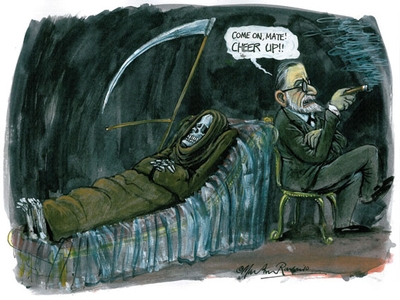 In 1910, Sigmund Freud published Five Lectures on Psycho-analysis, a short work that not only summarised a therapy but, more deeply, set the agenda that would recast the human soul in a new humane psych-ology. Despite his vilification as a pseudo-scientist by behaviourists and others, and then his co-option by postmodernists for their own anti-humanist programme, Freud remains the key architect of the Human over the past century, and perhaps our best hope for the next.
In 1910, Sigmund Freud published Five Lectures on Psycho-analysis, a short work that not only summarised a therapy but, more deeply, set the agenda that would recast the human soul in a new humane psych-ology. Despite his vilification as a pseudo-scientist by behaviourists and others, and then his co-option by postmodernists for their own anti-humanist programme, Freud remains the key architect of the Human over the past century, and perhaps our best hope for the next.
On the occasion of Freud’s 80th birthday, Thomas Mann presciently described the lasting influence of this feature of Freudian psychoanalysis: “We shall one day recognise in Freud’s life-work the cornerstone for the building of a new anthropology and therewith of a new structure, to which many stones are being brought up today, which shall be the future dwelling of a wiser and freer humanity. This physicianly psychologist will, I make no doubt at all, be honoured as the path-finder towards a humanism of the future…. It will be a humanism … bolder, freer, blither, productive of a riper art than any possible in our neurotic, fear-ridden, hate ridden-world…. The analytic revelation is a revolutionary force.”
How was it possible for Mann to extract this optimistic humanist message from a philosophy often characterised as determinist and fatalistic? Freud’s theory confronts a perplexing paradox – humans are determined, yet free. The deterministic unconscious, of course, is the central tenet of Freudianism, and wherever in his writings he discusses free will, Freud admonishes readers who assert their belief in such freedom as harboring a deep illusion. So Freud (and his readers!) must confront explicitly an apparent contradiction: on the one hand, psychic life is determined by the natural forces of the unconscious, and on the other hand, psychoanalysis allows an interpretation freed from that causative train. Indeed, the very promise of psychoanalysis builds upon the ability of reason to reveal the secrets of unconscious drives and thereby better control them. So when Freud asked in The Future of an Illusion, “It is true that men are like this [held by illusion]; but have you asked yourself whether they must be like this, whether their innermost nature necessitates it?”, he responded with a reserved hope in an ultimate belief in the promise of reason: “The voice of the intellect is a soft one, but it does not rest till it has gained a hearing. Finally, after a countless succession of rebuffs, it succeeds. This is one of the few points on which one may be optimistic about the future of mankind, but it is in itself a point of no small importance. And from it one can derive yet other hopes.”
Freud relied on the power of his Enlightenment reason – “There is no appeal to a court above that of reason” – and from that position he mused about a utopian psychology, whereby a liberation politics might emerge from psychoanalytic insight: “One would think that a re-ordering of human relations should be possible, which would remove the sources of dissatisfaction with civilisation by renouncing coercion and suppression of the instincts, so that undisturbed by internal discord, men might devote themselves to the acquisition of wealth and its enjoyment. That would be the golden age…. The decisive question is whether and to what extent it is possible to lessen the burden of the instinctual sacrifices imposed on men, to reconcile men to those which must necessarily remain and to provide a compensation for them.”
Underlying this and other writings is an assertion: psychoanalytic insight leads to redemption, it holds out the promise that despite the determinism governing inner psychic life, a freedom beckons. Accordingly, Freud’s “Enlightenment” thought might be developed towards a utopian social or political vision.
However, the utopian orientation splits psychoanalytic social theory between optimists and pessimists, each of whom make their claims based on Freud’s own pronouncements, which were neither consistent nor transparent. On the one hand, Freud may be interpreted as offering an understanding of culture that would allow the effective marshaling of Eros (at the expense of a destructive death drive). This is the “utopian” (or “positive”) interpretation of his work. On the other hand, if Freud is read as ultimately despairing of psychoanalytic redemption, because of the final dominance of the destructive psychic forces, then humankind is doomed. The past burdens the present and limits the future.
Two general approaches may be discerned among the optimistic readers of Freud: the first group concentrates on the individual and the possibilities for personal liberation, arguing that the fundamental conflict Freud identified lodges not between the individual and society, but rather within the individual herself, and that the sequels of that inner struggle are played out on the social stage. For example, Norman O Brown’s Life Against Death (1959) revised Freud’s essential oppositional construction of the instincts into a creative dialectic, where the erotic would emerge triumphant as a life-giving force.
Less ambitious, but nevertheless still optimistic, critiques regard psychoanalysis as a form of education. Philip Reiff’s Freud, Mind of the Moralist (1959) presented a Freudian portrait of “psychological man”, who learns to live with his conflicts and contradictions and seeks to maximise pleasure through the careful management of his inner life, which would then result in instinctual release and private well-being. Reconciliation with interminable inner conflict, derived from understanding, thus offers a certain form of freedom.
A second theme builds from a Marxist base, and regards the essential problem as firmly situated within the social domain, where oppressive (repressive) social restrictions and conformist mechanisms impede individual freedom. Herbert Marcuse’s interpretation, developed most clearly in Eros and Civilization (1955), allowed for autonomous agency, but re-configured social repression by following a Marxist line based on a revision of the reality principle: the so-called “performance principle” revises Freud’s original “reality principle,” and ordinary Freudian repression Marcuse re-configured as “surplus repression”, the “extra” repression required for capitalism to function effectively. An alteration in the degree of this necessary repression, such as might be achieved through technological advance, would help to liberate the ego.
These theoretical works were complemented by the development of Anglo-American ego psychologies. Perhaps the best exemplar of that school is Erich Fromm, who, in such works as The Anatomy of Human Destructiveness (1973), tacitly accepted a self-knowing, independent rational agent, whose ego, with proper guidance, might be saved from self-destruction and, moreover, achieve freedom from a repressive and domineering culture.
Fromm’s views radically differ from conceptions offered by the Frankfurt School and French post-Freudians, who used Freud’s pessimism about the ego’s uncertain self-knowledge to deconstruct the very notion of a “self”. So, whereas Freud asserted the primacy of the ego, anti-humanists contest the very notion of an autonomous rational agent and the moral possibilities attached to such a subject. The extensions of Freud’s programme follow several paths: dethroning the self-determined ego gained crucial support from Lacan, who conceived the ego as a receptacle of diffuse social forces and, consequently, lacking autonomy. Lacan denied that the conscious ego is either the author of her own acts or the meaning and value she assigns to them, because the subject does not know what she is (whether before analysis or after), and can only suffer illusion. This orientation emphasises the ego’s constraints, not its freedoms.
Although Freud himself remained circumspect about the ego’s authority, he still entrusted reason to fortify a rational ideal, and allowed the ego to retain its standing as the conduit to the unconscious: the ego’s knowledge, memory, self-consciousness and value structure remain the focus of therapeutic intervention. For Freud, de-centering the self does not eliminate ego identification. Indeed, how one approaches the question of selfhood in the end becomes not an epistemological question but a moral one. This was humanism in a new guise.
Freudianism offers an abiding truth: we are strangers to ourselves, because we live largely unconsciously; and as we recall our past and recognise a reconfigured personal history, we gain the opportunity to assume responsibility for who we are and what we might become. In the therapeutic context, freedom becomes an achievement as one pursues personal liberation from despotic unconscious forces. As Freud wrote in The Ego and the Id (1923), “Analysis does not set out to make pathological reactions impossible, but to give the patient’s ego the freedom to decide one way or the other.”
The possibilities of psychological perfection, namely the idea that psychoanalysis embraces a therapeutic ethos, despite all the disclaimers regarding efficacy and methodological verisimilitude, oriented Freud’s own efforts and remained the ethical foundation of psychoanalysis. So Freud pursued his psychoanalytic vision as a moralist. If we ask why the analytic pursuit occurs in the first place, we can easily follow the ancient’s own dictum: the “philosopher’s desire” to know the real and to glimpse the truth. That imperative is captured in the psychoanalytic credo, Wo Es war, soll Ich werden, which the Standard Edition renders, “Where id was, there ego shall be”. A more accurate translation, “where it [Id] was, I must become,” moves psychoanalysis from an epistemological endeavor to a moral one: Soll carries the sense of “duty” or “obligation”, and Freud thereby invoked an ethical imperative to explain the entire thrust of psychoanalysis to self-consciously analyse, understand and master the unknown.
Freud recognised the precarious place of reason in the psyche’s economy, and he understood with profound insight how reason’s own subjection to emotion severely compromised claims of autonomy and sacrosanct logic. However, he balanced uncertainty against the most effective cognitive tool humans possess, namely, reason.
Having recognised the power of the unreasoned unconscious and the weakness of the ego to direct the forces of the id, he asserted the standing of reasoned analysis as a moral imperative. Freud ultimately took a moral stand in favour of reason and this represents his greatest contribution.
Alfred Tauber is the author of Freud: The Reluctant Philosopher (Princeton University Press)

